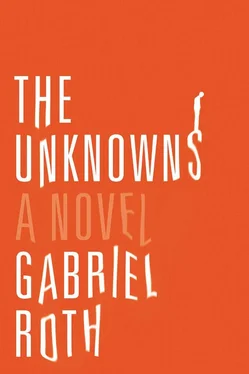“How did it turn out?”
“I totally obsessed over it,” she says. “Right up to the last minute I was adding things and taking things out and counting the number of words quoting each side, trying to make it balanced. I got a little carried away. And then the day it came out, I got to the office and there were two messages. I’m always so worried the day a big story comes out, I dread checking the messages because it’s usually someone threatening to sue. But that day there were two messages. One was from the priest and the other was from the head of the protesters, and they both said, basically, Thank you .”
“That’s awesome,” I say, because it is in fact awesome, and because I have a huge crush on her and am glad to be able to tell her that I think she’s awesome by pretending I’m talking about her story.
“So what about you?” she says. “Do you get obsessed over your work that way? Do you have a, like, a favorite program that you wrote or anything like that?”
The answer to both questions is yes, of course. But the joy of hacking doesn’t translate. If she’s like most people, computers are alien to her, mysterious electronic totems that require the ministrations of a shamanic caste of surly gnomes who live in the basement of her office building.
“I get pretty deep into it,” I say. “And the work I did for the startup, the interface I designed, I’m proud of that. I mean, I think it’s a good solution to a particular set of problems. But talking about it gets really boring to a non-programmer.”
“You worry a lot about keeping people on your side, huh?” she says.
“What do you mean?”
“If you were to answer my question, what’s the worst thing that could happen? I don’t think I’d be bored, but what if, worst case scenario, what if I was bored for a minute? Would that be the end of the world?”
I have to think about this. “Well, I don’t want to bore you. I mean…” This is hard, because the reason I don’t want to bore her is that I want her to like me, and obviously I can’t say that directly.
“I know, you don’t want to bore me, because you want me to like you,” she says. Whoa . “But you know, I’m going to make up my own mind about whether I like you, just like you’re going to make up your mind about whether you like me. And anyway, liking you is different from liking a TV show. The reason I like people is not that they never bore me. So why don’t you tell me about it, and if I don’t understand I’ll stop you and ask questions, which is what I do all day in my job, and if I get bored I’ll try to hide it until we’ve moved on to something else. OK?”
She drains the end of her drink, sets down the glass, and turns to face me. I look at her, and she looks at me, and that thing happens when you look at each other and realize, Hey, here we are . I ride it out, and then I jump in.
I try to describe what it’s like to get deep inside a really hard problem: loading all the pieces into my mind, seeing the relationships between abstract concepts as though they were the physical features of a landscape. I tell her about the marathon hacking runs I used to go on, first when I was a teenager and again in the desperate early days of Demo1, spending twenty hours at a stretch making a program more sprawling and complex and powerful but also more elegant, more beautiful. (It feels risky, using the word beautiful , but there’s no other way to say it.) I try to convey the experience of settling into hack mode, the way the cruft and chatter of consciousness quiet down, stripping away the self’s topsoil and allowing the deeper, truer self to emerge. We are most ourselves when we subsume ourselves in something greater is a paradox at the heart of every mystical practice, programming not excepted. This experience of logical-reasoning-as-metaphysical-transcendence has been observed in older vocations like chess and mathematics. A mathematician presented with a clever proof, or a grandmaster lighting on a devastating move, might replay the sequence in his head just to savor it, as though humming a passage from a Mozart concerto. I feel the same thing when I read or write a well-constructed chunk of code: this is logic so artful it’s indistinguishable from art.
While I put this into words, Maya listens carefully and says “Uh-huh” and occasionally shuts her eyes and nods as if swallowing an idea, in what appears to be a kind of mental note-taking. If she’s bored, she’s good at disguising it.
“Thanks,” she says. “Now I know something important about you.”
“No problem,” I say. I’m not used to being reassured like this.
“This is going pretty good, huh?” she says. At first I don’t understand what she’s referring to, and then I get it and I desperately want to kiss her.
“I think so, yeah,” I say. “Ha! I’ve never tried evaluating a date while it’s still in progress.” By introducing the word date I’m trying to match her audacity.
“It’s such an artificial thing,” she says, resting an elbow on the bar and propping her chin in her palm. “We both know what we’re doing, but we’re not allowed to talk about it.”
“No, you’re totally right,” I say. “I love it. Listen, if we’re going to externalize: you have reminded me of an anecdote. Are you interested in hearing an anecdote at this juncture, or would you rather the conversation progressed in a different direction?”
“An anecdote would be terrific,” she says. “Let me order another drink, and then you can tell me the anecdote. Is it funny?”
“Oh, I can’t answer that,” I say. “Starting an anecdote with This is a really funny anecdote would be a gross violation of sound anecdote technique.” We are both grinning.
“You’re right, you’re right,” she says, holding up her glass in Freya’s direction. Freya gives me an interrogative look, and I respond with an affirmative nod.
“This anecdote falls into the world’s-worst-date genre,” I say as Freya sets down the new drinks and removes the old, using both hands to perform the operations in parallel on Maya’s glass and mine. “It happened not to me but to my mom.”
“Before your mom and dad were married?”
“After they got divorced,” I say. “I remember when this happened.”
“Got it,” she says. “OK, go.”
“So they’d been divorced for like two years,” I say. “My mom was really wanting to start dating someone, and she wasn’t meeting anyone through her job or anything, and this was when dating services operated by mail and catered chiefly to the desperate. So she’d asked her friends at work to fix her up, and one day her friend Doreen was all like Oh my God, I have found the perfect guy for you !
“My mom is pretty short, and she says that whenever anyone says the perfect guy for you they mean short and divorced . She meets the guy for dinner, and it’s confirmed that these are the only qualities that make him suitable for my mom. And the short thing is only suitable from his perspective, because she doesn’t even like short men; she likes tall men, just like everybody else.” I can get away with this because of the precise averageness of my height. “She once said that short men get offended when she doesn’t want to go out with them, like it’s her responsibility to help them breed more short people so that the inability to reach things on high shelves will survive to the next generation.
“Anyway: the guy is apparently completely charmless. He drives her home from the date, and he invites himself in for coffee — as in, literally, he says, May I come inside for a cup of coffee ? And it’s this incredibly complicated moment for my mom, because on the one hand she knows just as well as any other television-watching adult what coffee is a euphemism for, but she really wants to be polite — she’s a very polite person — and it wouldn’t be polite to refuse a cup of coffee to someone who’s just bought you dinner. It’s like she’s trapped in the semantic gap between the literal and the figurative meanings of the word coffee . And in the end, she just doesn’t have the vocabulary to say no — it’s not in her social-behavior repertoire. So they go inside the house, and my mom puts some coffee on and sits down very deliberately in the armchair rather than on the couch next to the guy, and they sit there and wait for the coffee to percolate. And just as she’s getting up to pour the coffee, my dad’s car pulls up outside, and he gets out in his undershirt.”
Читать дальше












